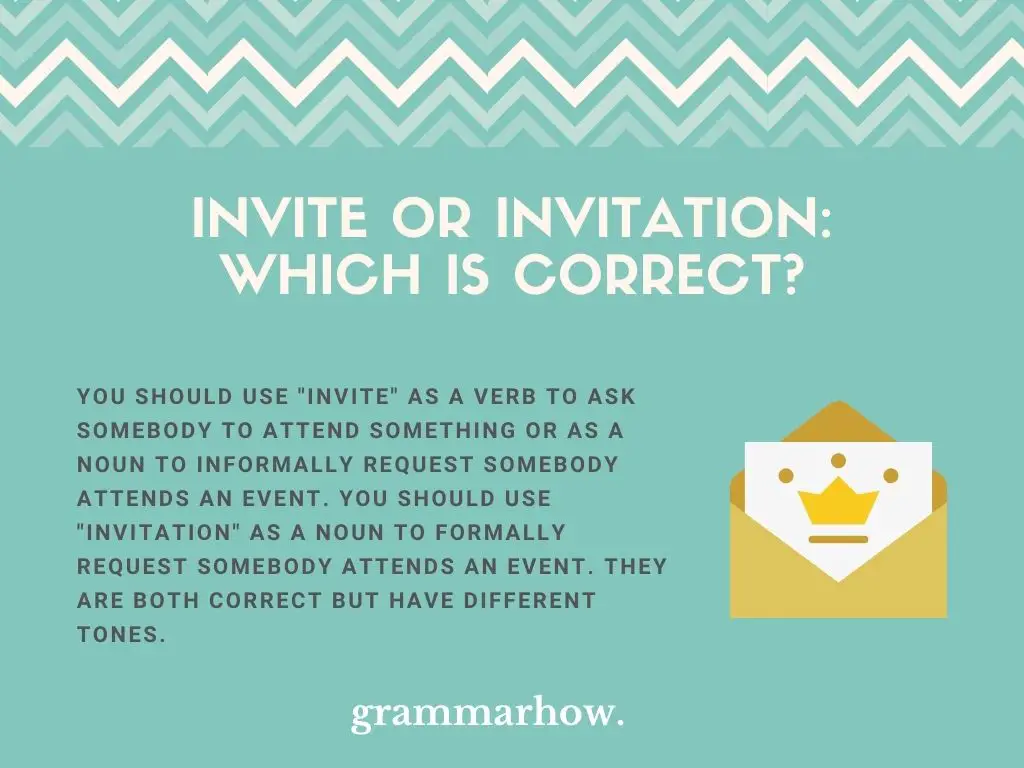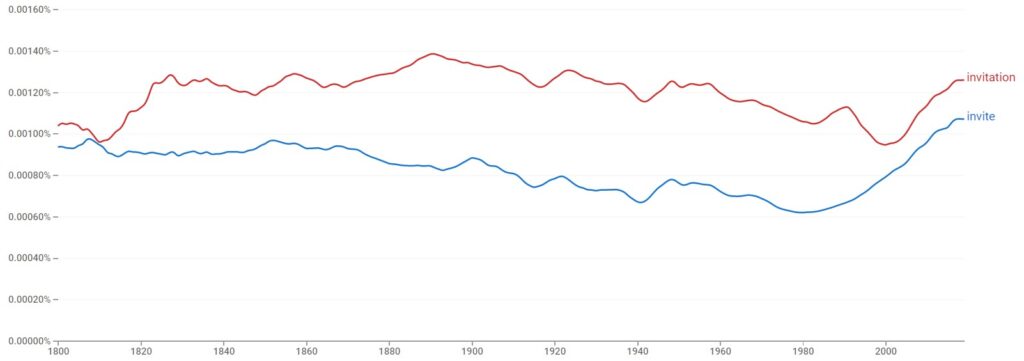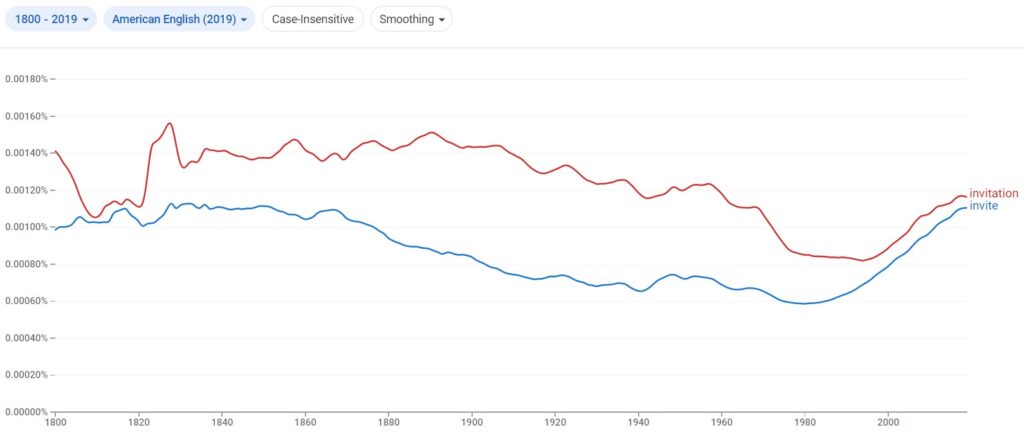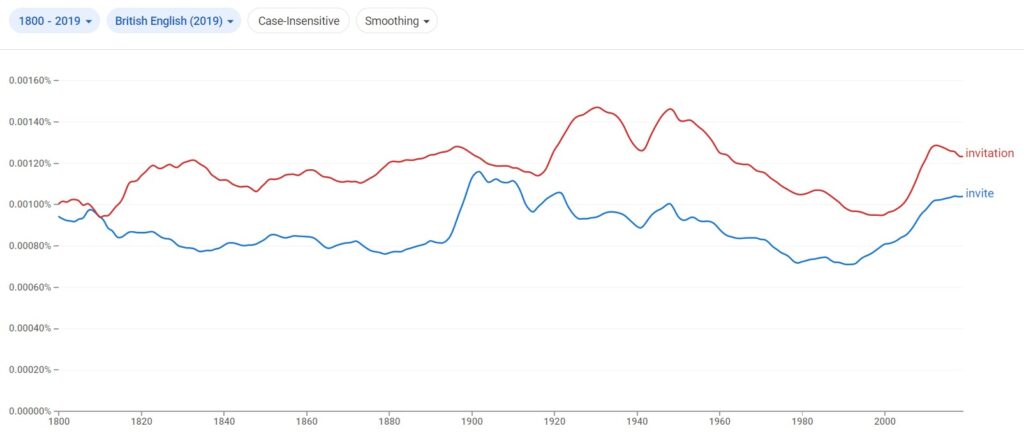invite — перевод на русский
/ɪnˈvaɪt/

She thinks I’ve invited a lot of other people.
Она думает, что я пригласил еще других гостей.
He’s already invited me for a weekend of fishing.
Он уже пригласил меня на выходные порыбачить.
I want you to invite André Jurieux.
Я хочу, чтобы ты пригласил Андре Журье.
— Did you really invite Jurieux?
— Ты правда пригласил Журье? — Правда.
Who’d you say invited you?
Кто вас пригласил?
Показать ещё примеры для «пригласил»…
And now, my dear friends, after we elevated our hearts and minds, I invite you to come and toast the success of our endeavour and the happiness of our newlyweds.
А теперь, дорогие друзья, я приглашаю вас поднять тост за успех нашего начинания и за счастье наших молодоженов.
Well, I’m inviting you!
— Ну, я тебя приглашаю!
I’m inviting you then.
Тогда я вас приглашаю.
Hey, fellas, I’m inviting everyone, come on!
Эй, ребята, я приглашаю всех, идёмте!
I’m inviting you to the rehearsal of Achard’s play on Friday.
Приглашаю вас на генеральную репетицию пьесы Ашара в пятницу.
Показать ещё примеры для «приглашаю»…
«Dear sister, The famous Prince Zsbrschosky— by the way, a charming gentleman, and not without means — is giving a large ball to which we are invited.
Дорогая моя сестра, знаменитый князь Жбршонский кстати, очаровательный господин, и весьма богат устраивает большой бал, на который и мы приглашены.
You’re all invited to the wedding of Aunt Fanny’s eight-pound boy.
Вы все приглашены на свадьбу 8-фунтового мальчика тетушки Фанни.
Ladies and gentlemen, you’re all invited to attend the wedding of my daughter.
Дамы и господа, вы все приглашены на свадьбу моей дочери.
-Are we invited to the wedding?
— А мы приглашены на свадьбу?
The ladies are also invited.
Назавтра приглашены главные сотрудники вместе с супругами.
Показать ещё примеры для «приглашены»…
Did you get that invite?
Ты получила приглашение?
You are hereby formally invited for a glass of wine.
Ни к чему не обязывающее приглашение на рюмку вина.
Did she invite him to dinner? Yes.
Ее приглашение, не…
He was invited because of me.
Приглашение, благодаря мне.
We’re only going to Sternberg’s. He invited us to his uncle’s estate.
Мы тоже домой не едем, а лишь принимаем приглашение Штернберга поехать в имение его дяди.
Показать ещё примеры для «приглашение»…
— I invited you all here to meet a murderer.
— Я позвал вас познакомиться с убийцей.
So I invited her to your box today, do you understand?
А сегодня я позвал ее в твою ложу.
I’m gonna go back to my bed, I’m gonna put away the best part of a bottle of Scotch and under normal circumstances, you being normally what I’d call attractive, I would have invited you back to share my little bed with me and you might have come.
Я лягу в кровать, возьму с собой бутылочку виски. При нормальных обстоятельствах, учитывая, что вы привлекательная, я бы позвал вас в кровать, и вы, возможно, согласились бы.
— You invited him?
— Это ты позвал его? !
— You invited me and don’t even have a wine to spare.
— Позвал в гости, а теперь жадничаешь.
Показать ещё примеры для «позвал»…
Who invited you?
Мы тебя не звали.
I was not invited.
Меня не звали.
They invited me to be his jester. Bu what do I need the prince for?
Меня звали в шуты, да что мне князь?
— I’m not invited.
— Меня не звали.
They didn’t invite us here.
Они не звали нас сюда.
Показать ещё примеры для «звали»…
I’ll say Tiercelin invited me to his country home for Easter.
Скажу,что Тирселин предложил провести Пасху у него в деревне.
A mate invited me into part ownership with nine other guys, so I own one tenth of the yacht.
Товарищ предложил мне взять ее в совместное пользование вместе с 9 друзьями, так что мне принадлежит лишь десятая доля яхты.
For a small but international case he had to visit a village in the north and he invited me to accompany him.
Для небольшого международного дела ему нужно было посетить северную деревню и он предложил мне его сопроводить
Helmont invited us to visit with him in the castle.
Хельмут любезно предложил нам провести один день в его поместье.
Three months since I first invited you to be my favourite restaurateur.
Три месяца, как я предложил тебе быть моим любимым ресторатором.
Показать ещё примеры для «предложил»…
You’re a man of intelligence, so I invite you… to examine your own story in the light of those two facts.
Вы умный человек и я предлагаю Вам… взглянуть на историю в свете этих двух фактов.
Inviting’ you to share my life, Miss Prescott.
Мисс Прескотт, я предлагаю вам разделить со мной жизнь.
Before we proceed, I invite the parties to settle their differences amicably.
Прежде, чем мы начнём, я предлагаю двум сторонам уладить свои разногласия мирным путём.
I invite you all to recall the moment when I…
я предлагаю вам вспомнить мгновение, когда я…
Oleg invites me to celebrate at the Ostankino TV tower restaurant.
Олег предлагает встречать Новый Год в ресторане Останкинской башни.
Показать ещё примеры для «предлагаю»…
I will not have his education but I know to tolerate to me with who it invites to me.
Я не такой образованный как ты, но я знаю как должны вести себя гости.
You’re my invited guests.»
Вы — мои гости.
You’ll be dining alone. We’re invited for diner at the President of the Bar’s.
Ты будешь обедать один, мы с отцом уходим в гости.
Find something to do or invite somebody.
Займись чем-нибудь или позови кого-нибудь в гости.
Everyone that was invited… is related to one of the staff that was here when the place burnt.
Все гости — это потомки когда-то работавших в лечебнице сотрудников!
Показать ещё примеры для «гости»…
I invited myself.
Я сам напросился.
I must admit I invited myself. You don’t have to do that with Anthony, he just expects people to arrive.
— Должен признаться, я сам напросился.
— He just sort of invited himself.
— Он вроде как сам напросился.
Oh, I’d love to, now that I’ve invited myself.
С удовольствием, раз уж я сама напросилась. Привет.
I invited myself to lunch.
Я напросилась к ней на обед.
Показать ещё примеры для «напросился»…
Отправить комментарий
Used with adverbs:
«He was formally invited to the banquet.«
(formally, officially, personally, cordially)
«She kindly invited our family to dinner.«
(kindly, warmly, graciously)
«They have invited us over for dessert.«
(over)
«He was invited back to their house.«
(back)
«He practically invited himself over for dinner.«
(practically)
Used with prepositions:
«She likes to invite people into her home.«
(into, in, to)
«Let’s invite her family for dinner.«
(for)
«I don’t want to invite him to the party.«
(to)
Used with nouns:
«She invited her neighbors to stay for dinner.«
(neighbors, guests)
- Use the word invite in a sentences
Sentence Examples
How about if I invite myself along?
We invite you to our tournament this evening. The Chess Club
«And I doubt that we could invite respectable folk over any more,
When the two theologians from Copenhagen saw they could not reach their goal by words alone, they joined forces to invite everyone to a feast that evening.
Out of common decency, they were obliged to invite Sofren too.
«You forgot to invite me?»
I’d like to invite you to my home.
Leave for Worms, Blaodel, to invite the royal brothers of my wife as guests to our court!
Tronje, announce to the people of Burgundy that I invite everybody to a royal hunt to kill a mad dog and a ravening.
«I hope you will invite us again.»
«I am desperate — if you refuse to invite me tonight I will go to my daughter and tell her who I am!»
ÔÇô All right, I invite you all to tea instead of Akakiy Akakievich. As luck would have it, it is my name day.
We invite readers with the smallest feet in the country to appear today at 3 pm.
Gee, that’s great. Did he invite us?
Suppose I invite Mrs. Potter and Polly to take supper with me tonight?
Did Mother invite a fish peddler here?
Well, I thought maybe if I cooked it myself, you might invite me to breakfast.
Jerome Toenli is pleased to invite you to his home tonight
I will have to invite them next week.
Now’s a good time to invite them.
I invite your views, gentlemen.
I couldn’t invite him without his wife.
And her lover, Mr Truchet? Did you have to invite him too?
We have to invite everybody.
You picked a fine day to invite people for lunch!
After all, I have a right to invite a few of my friends to my house, haven’t I?
Well, aren’t you going to invite me?
Phyllis, if you don’t invite me, I’m coming anyway.
Let us invite the gods to preside over the union of Priapus Boudu and his Chloë Anne-Marie.
Whatever made you invite that rude man?
You bet I’ll invite them.
Wanted me to invite the crowd out to his place for a party.
I’ve been wanting to thank you for having Romer invite us here.
You know who we’ll invite, don’t you?
It’s dangerous to invite guests with a girl like that around. Somebody will sue us.
Why didn’t you invite me up last week?
We invite A very special day for us.
Even your own family, they never invite me anywhere.
If he did, I could invite the whole town to the party.
If you don’t invite them within five minutes after they arrive I’ll walk in and make a scene that Shakespeare couldn’t top.
Don’t we have to invite them, too?
You can invite Dan Packard and his wife.
OTHERWISE, I CONGRATULATE YOU ON HAVING MADE GOOD WITH US, AND I invite YOU TO CONTINUE IN YOUR PRESENT POSITION.
YOU invite ME TO CONTINUE, DON’T YOU?
I wanted to invite you to our gathering today.
That we thought maybe you could invite us to the homes of the movie stars so we could kind of look around.
You might want to invite him to our reception.
How about if I invite myself along?
We invite you to our tournament this evening. The Chess Club
«And I doubt that we could invite respectable folk over any more,
When the two theologians from Copenhagen saw they could not reach their goal by words alone, they joined forces to invite everyone to a feast that evening.
Out of common decency, they were obliged to invite Sofren too.
«You forgot to invite me?»
I’d like to invite you to my home.
Leave for Worms, Blaodel, to invite the royal brothers of my wife as guests to our court!
Tronje, announce to the people of Burgundy that I invite everybody to a royal hunt to kill a mad dog and a ravening.
«I hope you will invite us again.»
«I am desperate — if you refuse to invite me tonight I will go to my daughter and tell her who I am!»
ÔÇô All right, I invite you all to tea instead of Akakiy Akakievich. As luck would have it, it is my name day.
We invite readers with the smallest feet in the country to appear today at 3 pm.
Gee, that’s great. Did he invite us?
Suppose I invite Mrs. Potter and Polly to take supper with me tonight?
Did Mother invite a fish peddler here?
Well, I thought maybe if I cooked it myself, you might invite me to breakfast.
Jerome Toenli is pleased to invite you to his home tonight
I will have to invite them next week.
Now’s a good time to invite them.
I invite your views, gentlemen.
I couldn’t invite him without his wife.
And her lover, Mr Truchet? Did you have to invite him too?
We have to invite everybody.
You picked a fine day to invite people for lunch!
After all, I have a right to invite a few of my friends to my house, haven’t I?
Well, aren’t you going to invite me?
Phyllis, if you don’t invite me, I’m coming anyway.
Let us invite the gods to preside over the union of Priapus Boudu and his Chloë Anne-Marie.
Whatever made you invite that rude man?
You bet I’ll invite them.
Wanted me to invite the crowd out to his place for a party.
I’ve been wanting to thank you for having Romer invite us here.
You know who we’ll invite, don’t you?
It’s dangerous to invite guests with a girl like that around. Somebody will sue us.
Why didn’t you invite me up last week?
We invite A very special day for us.
Even your own family, they never invite me anywhere.
If he did, I could invite the whole town to the party.
If you don’t invite them within five minutes after they arrive I’ll walk in and make a scene that Shakespeare couldn’t top.
Don’t we have to invite them, too?
You can invite Dan Packard and his wife.
OTHERWISE, I CONGRATULATE YOU ON HAVING MADE GOOD WITH US, AND I invite YOU TO CONTINUE IN YOUR PRESENT POSITION.
YOU invite ME TO CONTINUE, DON’T YOU?
I wanted to invite you to our gathering today.
That we thought maybe you could invite us to the homes of the movie stars so we could kind of look around.
You might want to invite him to our reception.
The words “invite” and “invitation” are very similar. They both come from the root word “invite” and mean sending something to someone. This article will look at the direct differences between the two and how best to use them.
Invite Or Invitation: Which Is Correct?
You should use “invite” as a verb to ask somebody to attend something or as a noun to informally request somebody attends an event. You should use “invitation” as a noun to formally request somebody attends an event. They are both correct but have different tones.
The definition of “invite,” according to The Cambridge Dictionary, is “to ask or request someone to go to an event.” It’s more common to see it used like this in the verb form. In the noun form, it’s interchangeable with “invitation.”
The definition of “invitation,” according to The Cambridge Dictionary, is “the act of inviting someone to go to an event.” “Invitation” requires someone to “invite” you to an event.
The two words both mean the same thing; it mostly depends on the form you use. Generally speaking, you’ll find “invitation” in more formal cases, and “invite” in more informal ones.
Is “Invite “Or “Invitation” Used The Most?
So, which of the two phrases is more popular? We often find that when we look at the statistics for words like this, we’ll see a sizeable difference between the two. That usually helps us to determine which one we should focus on learning more about.
According to Google, “invite” is mentioned 42,000 times on The New York Times website, while “invitation” is mentioned 51,200 times. The difference in usage here isn’t very clear, which shows how similar the words are.
Native speakers don’t often pay attention to the difference, especially not in spoken English. In written English, it’s usually more common to write “invitation” if you’re presenting a formal event; otherwise, you can use them interchangeably.
According to this graph, we can see that both “invitation” and “invite” are almost identical in usage. Of course, this graph is probably looking at “invitation” as a noun and “invite” as a verb, but it shows just how similar they both are.
In the case of using them both as a noun, you’ll usually find them about equal, depending on the writing tone. Many people wouldn’t mind receiving a “wedding invitation” or a “wedding invite.” They’re both synonymous with each other, which is handy when learning about them.
Is “Invite” And “Invitation” Used Differently In American English And British English?
We can go further with the statistics to see if there’s much difference between American and British English. Usually, American English will sway towards the more informal saying in these cases, while British English will move towards the formal one.
However, the difference between “invite” and “invitation” doesn’t seem to be as apparent in either of the languages.
According to this graph, both words are used almost identically in American English. “Invitation” is slightly more popular, but the difference is negligible.
According to this graph, we can say the same about British English. “Invitation” is slightly more popular, but there isn’t that much difference between either.
In spoken English, the differences become slightly more apparent.
American English uses “invite” more as a noun, while British English uses “invitation” as the noun. You can find both words in both languages; it mainly depends on the tone of writing as to which one you will use.
Spoken English rules are usually more relaxed than written English rules, which is probably why there isn’t much difference between them in the two graphs we shared (since those graphs only cover the differences in written English).
Also, the graphs don’t identify the differences between “invite” as a noun and a verb, so it’s likely they’re grouped, while “invitation” is only ever used as a verb.
If I Am Not From The US Or The UK, Should I Use “Invite” Or “Invitation”?
If you’re not from either the US or the UK, you might be a little confused about which language you should use. Luckily, it’s not that complicated when it comes to remembering the differences between “invite” and “invitation.”
Non-English-speaking countries tend to use British English as their main language. That means that both words work. “Invite” is best in informal situations, while “invitation” works better in formal cases.
Because the words are synonymous, it makes it much easier for non-English-speaking countries to use them. Usually, you’d have to decide between British or American English rules, but they seem to be the same thing in this case.
Can “Invite” And “Invitation” Be Used Interchangeably?
As we’ve previously mentioned, the most common way you’ll see either of these words written is in the interchangeable sense. They have identical meanings, which shows you can use them both in the same way.
“Invite” and “invitation” are interchangeable. The only time you’ll ever need to think about which one to use comes down to which tone you want to write with.
- Informal:Invite
- Formal:Invitation
To help you make sense of this better, we encourage you to use both “invite” and “invitation” in an informal tone. It doesn’t matter which one you use because no native speaker will tell you that you’re wrong (since they’re both correct).
In a formal tone, they’re not interchangeable. You should only use “invitation” and never confuse it with “invite.”
If you can remember those two rules, you’ll have no problems with these words.
Examples Of How To Use “Invite” In A Sentence
Let’s go over some examples of them both in sentences. We’ll start with the informal one, “invite.” We’ll include it in both the verb form and the noun form so you can see when you should use them.
Verb
- I’d like to invite you to my party.
- We’re inviting you to our wedding.
- You’re invited!
- He’s not invited to my event!
Noun
- I’ve got your wedding invite in the mail!
- You’ve just received an invite to the council event.
- We’ve got an invite in the mail for something we’ve never heard of.
- I think it’s time to send out the invites.
Examples Of How To Use “Invitation” In A Sentence
Now let’s go over using “invitation” in a sentence. This is only ever used as a noun, so we don’t have to worry about the verb form here. It’s also more appropriate to see this in formal situations, so pay attention to the tone of the following examples.
- These are the wedding invitations they’ve asked us to look through.
- You’ve got a meeting invitation in your emails.
- I haven’t received an invitation.
- Are there any more invitations we need to send out?
- My boss has given me an invitation to attend a disciplinary hearing.
Is There Any Difference Between “Invite To” And “Invite For”?
When used in the verb form, “invite” is often followed by a preposition like “to” or “for.” Prepositions have a habit of changing the meanings of words, so we thought we’d explain the differences between these two.
You should use “invite to” when you’re inviting somebody to an event or a venue. You should use “invite for” when you’re inviting somebody to take part in an activity with you.
- I’m inviting you to join me at the party.
- Where’s my invite for dinner?
Is “Invite” Informal?
“Invite” is informal compared to “invitation.” Recently, it has begun to pick up popularity as a noun rather than a verb. It’s common for people to use it synonymously with “Invitation,” though it’s the more informal choice of the two.
Is It Invite Or Invites You?
“Invite” is used when we want to talk about it in the noun form. It means we’re presenting somebody with something (a physical item or our word) to ask them to join us in something. “Invites you” is the verb form we use when doing the action of inviting somebody.
- This is an invite to my party. (Noun form)
- He invites you to the party. (Verb form)
Is It Thank You For The Invite Or Invitation?
“Thank you for the invite” is best in informal situations, or when the person sent you an “invite” that was specified. “Thank you for the invitation” is best in formal situations, or when the “invitation” specifically includes the word “invitation” on it.
Do You Say Meeting Invite Or Meeting Invitation?
A “meeting invitation” is almost always the form you’ll come across. Generally, a “meeting” is a formal occurrence at the workplace or somewhere similar. “Invitation” is the formal noun that should accompany it at all times.
Is It “A Invitation” Or “An Invitation”?
“An invitation” is the correct spelling. “An” is a determiner that must be used before words that start with a vowel (a, e, i, o, u) or before words that sound like they start with a vowel (hour, honor).
Using “a” as the determiner only works for words that start with a hard consonant sound. So “a invitation” is always incorrect. This rule applies to every other part of English, so it’s important to learn it as soon as possible.
Martin holds a Master’s degree in Finance and International Business. He has six years of experience in professional communication with clients, executives, and colleagues. Furthermore, he has teaching experience from Aarhus University. Martin has been featured as an expert in communication and teaching on Forbes and Shopify. Read more about Martin here.





